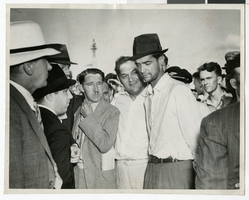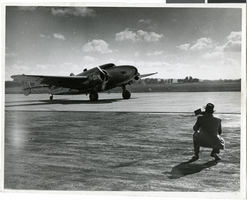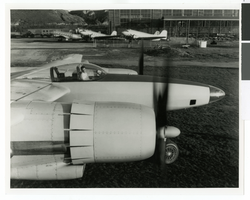Search the Special Collections and Archives Portal
Search Results

Photograph of Howard Hughes after arriving in Minneapolis, Minnesota, July 14, 1938
Date
1938-07-14
Archival Collection
Description
The black and white view of Howard Hughes in Minneapolis, Minnesota. Description written on back of photograph: "July 14, 1938: Tired and bearded, Howard Hughes was surrounded as he left his plane at the municipal airport (World-Chamberlain Field) to secure weather information before leaving Minneapolis to complete his record-breaking around-the-world flight-- the fastest flight ever made in circumnavigating the globe. Photo-courtesy "The Minneapolis Star" Board of Park Commissions 325 City Hall Minneapolis, Minn."
Image

Photograph of Howard Hughes after arriving in Minneapolis, Minnesota, July 14, 1938
Date
1938-07-14
Archival Collection
Description
The black and white view of the Lockheed 14 aircraft in Minneapolis, Minnesota. Description written on back of photograph: "World-fame drops on City out of blue, sunny skies: Fame came to the municipal airport and the city of Minneapolis in a flash of silver and a roar at 7:38 am, July 14, 1938 when Howard Hughes swooped to Earth in his Droning Silver Bullet on his record breaking round-the-world flight. Photo-courtesy "The Minneapolis Star" Board of Park Commissions. 325 City Hall Minneapolis Minn."
Image
Howard Hughes in Moscow, Russia, 1938 July
Level of Description
File
Archival Collection
Howard Hughes Public Relations Photograph Collection
To request this item in person:
Collection Number: PH-00373
Collection Name: Howard Hughes Public Relations Photograph Collection
Box/Folder: Folder 07
Collection Name: Howard Hughes Public Relations Photograph Collection
Box/Folder: Folder 07
Archival Component
Howard Hughes in Moscow, Russia, 1938 July
Level of Description
File
Archival Collection
Howard Hughes Public Relations Photograph Collection
To request this item in person:
Collection Number: PH-00373
Collection Name: Howard Hughes Public Relations Photograph Collection
Box/Folder: Folder 07
Collection Name: Howard Hughes Public Relations Photograph Collection
Box/Folder: Folder 07
Archival Component

Howard Hughes in cockpit of the first XF-11, Culver City, California, July 7, 1946
Date
1946-07-07
Archival Collection
Description
Howard Hughes warming up the first XF-11 prototype.
Image
Howard Hughes and Jesse Jones, 1938 July
Level of Description
File
Archival Collection
Howard Hughes Public Relations Photograph Collection
To request this item in person:
Collection Number: PH-00373
Collection Name: Howard Hughes Public Relations Photograph Collection
Box/Folder: Folder 13
Collection Name: Howard Hughes Public Relations Photograph Collection
Box/Folder: Folder 13
Archival Component
Parade in Chicago held for Howard Hughes, 1938
Level of Description
File
Archival Collection
Howard Hughes Public Relations Photograph Collection
To request this item in person:
Collection Number: PH-00373
Collection Name: Howard Hughes Public Relations Photograph Collection
Box/Folder: Folder 14
Collection Name: Howard Hughes Public Relations Photograph Collection
Box/Folder: Folder 14
Archival Component
Parade in Chicago held for Howard Hughes, 1938
Level of Description
File
Archival Collection
Howard Hughes Public Relations Photograph Collection
To request this item in person:
Collection Number: PH-00373
Collection Name: Howard Hughes Public Relations Photograph Collection
Box/Folder: Folder 14
Collection Name: Howard Hughes Public Relations Photograph Collection
Box/Folder: Folder 14
Archival Component
Parade in Chicago held for Howard Hughes, 1938
Level of Description
File
Archival Collection
Howard Hughes Public Relations Photograph Collection
To request this item in person:
Collection Number: PH-00373
Collection Name: Howard Hughes Public Relations Photograph Collection
Box/Folder: Folder 14
Collection Name: Howard Hughes Public Relations Photograph Collection
Box/Folder: Folder 14
Archival Component
Parade in Chicago held for Howard Hughes, 1938
Level of Description
File
Archival Collection
Howard Hughes Public Relations Photograph Collection
To request this item in person:
Collection Number: PH-00373
Collection Name: Howard Hughes Public Relations Photograph Collection
Box/Folder: Folder 14
Collection Name: Howard Hughes Public Relations Photograph Collection
Box/Folder: Folder 14
Archival Component
Pagination
Refine my results
Content Type
Creator or Contributor
Subject
Archival Collection
Digital Project
Resource Type
Year
Material Type
Place
Language
Records Classification
